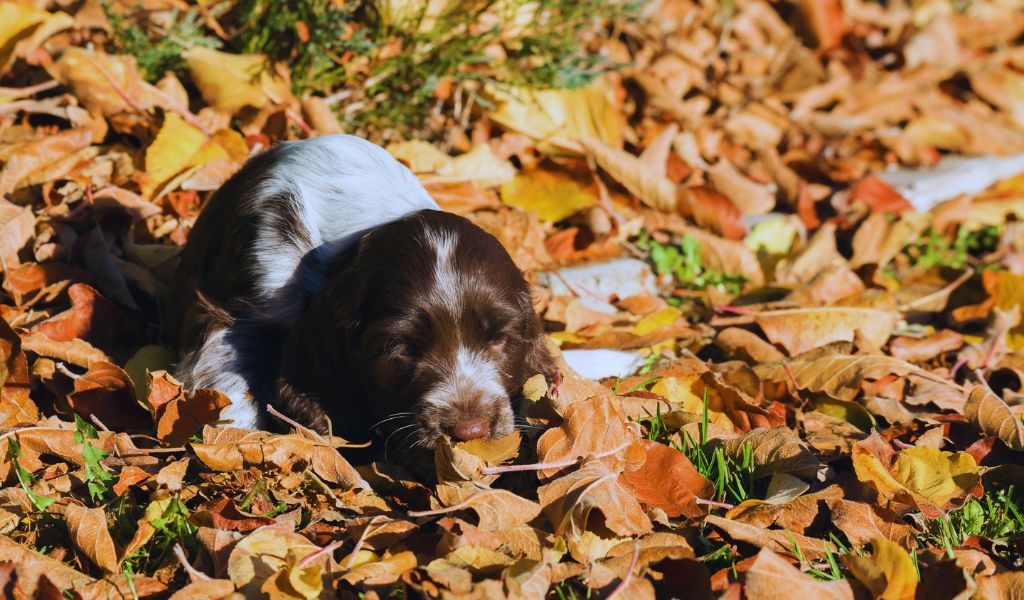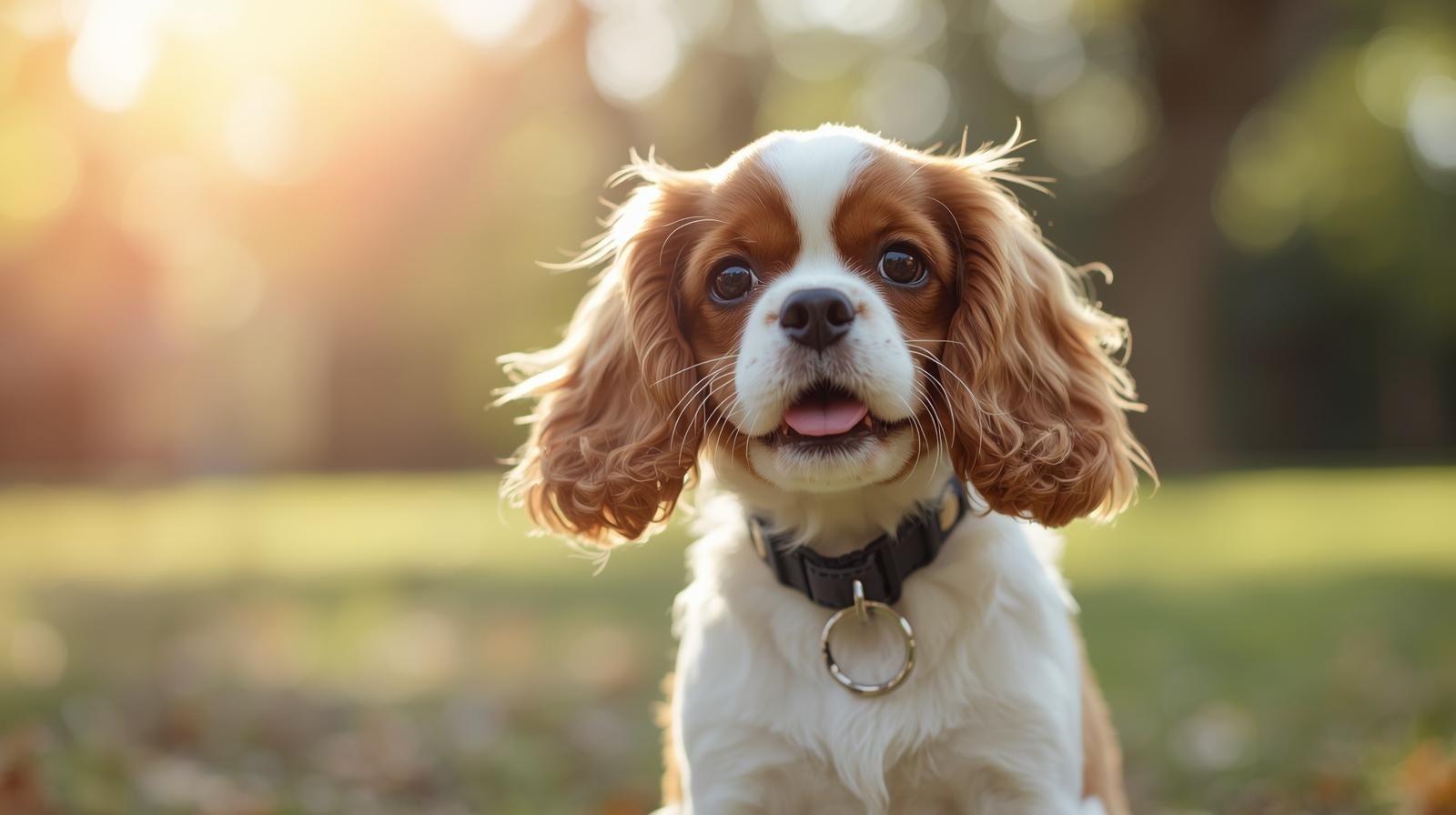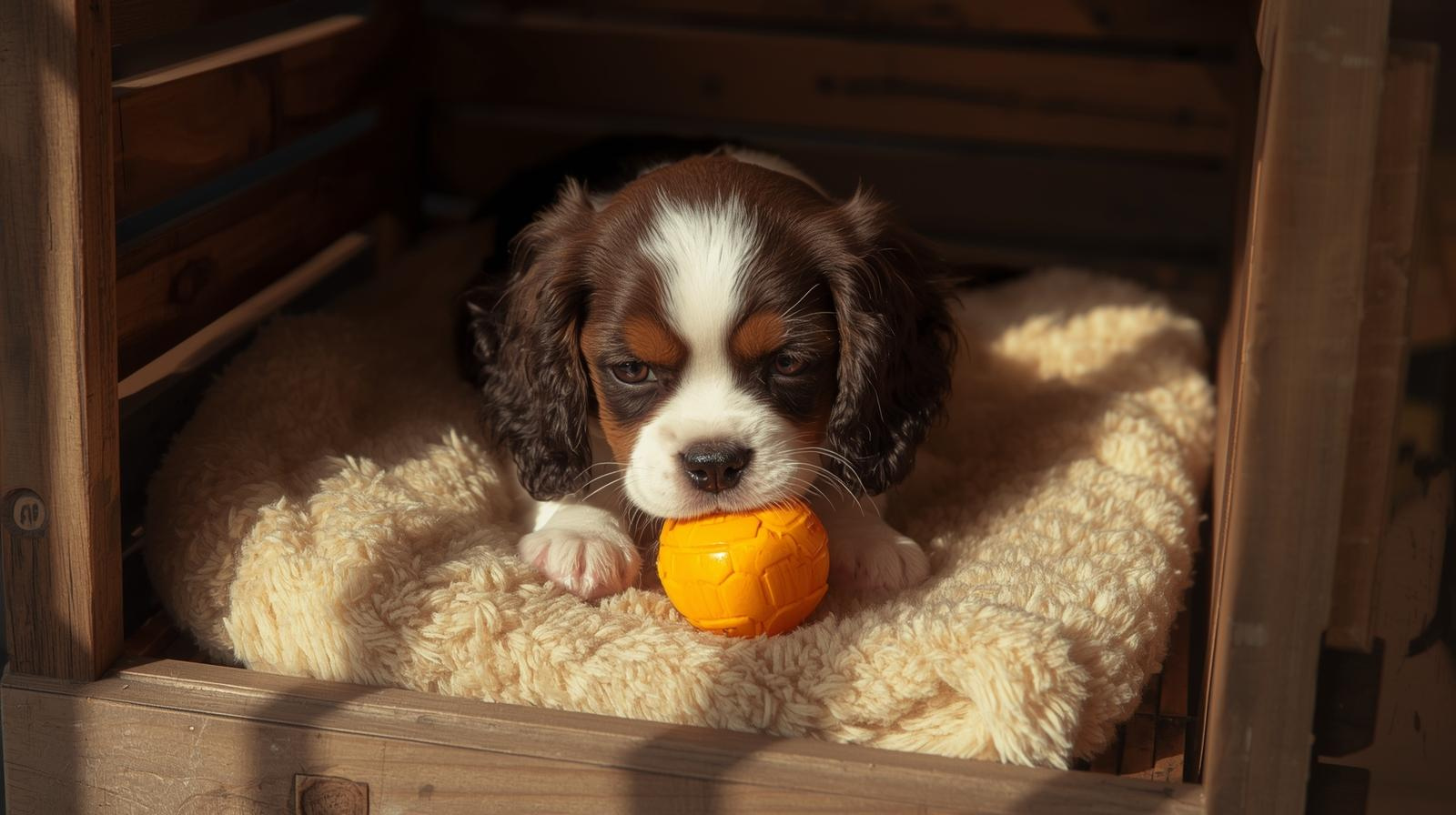Bringing home a new Cocker spaniel puppy is an exciting occasion. However, training a new puppy can also be a challenging and daunting task.
Whether you are a first-time pet owner or a seasoned dog lover, having a comprehensive training guide specific to the Cocker spaniel breed can make all the difference in ensuring a well-behaved and happy pup.
In this Cocker spaniel puppy training guide, we will cover everything you need to know to successfully train your new dog.
From basic obedience commands to house training, socialisation, and dealing with common behaviour issues, our guide will provide you with practical tips and techniques to set your Cocker spaniel puppy up for success.
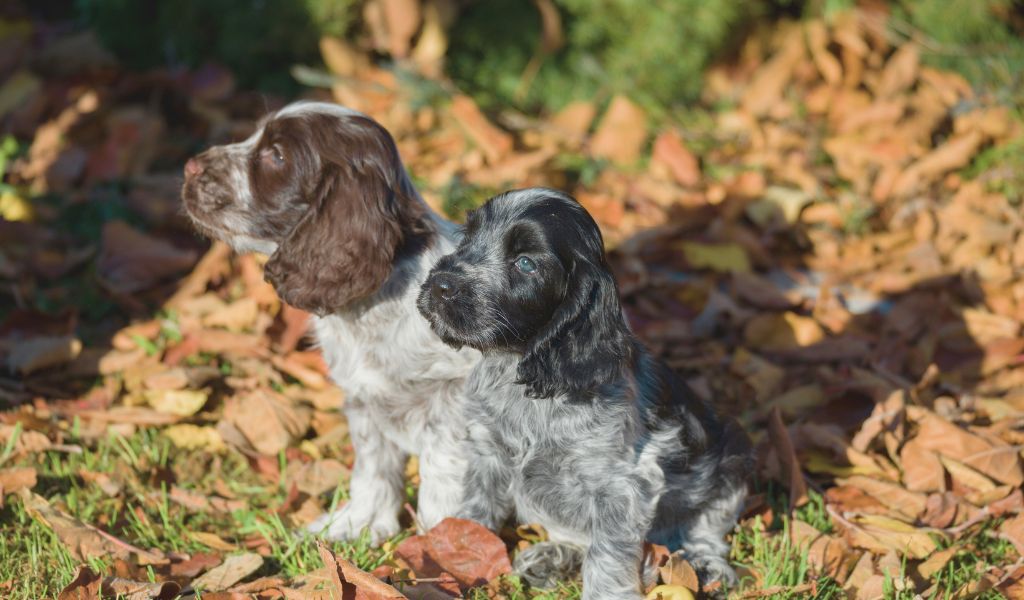
Understanding the breed
The Cocker spaniel is a beloved breed known for its friendly and affectionate nature. Originally bred as hunting dogs, Cockers are now popular as loving family pets.
They are medium-sized dogs with a sturdy build and a silky, wavy coat that comes in a variety of colours. Their expressive eyes and long, fluffy ears give them an adorable appearance.
Cocker spaniels are highly intelligent and trainable, making them great companions for various activities such as obedience training, agility, and flyball.
They thrive on human companionship and require regular exercise to keep them happy and healthy. With proper grooming and care, Cocker spaniels have a lifespan of 12-15 years.
They are known for their playful and gentle demeanour, making them excellent pets for families with children.
Overall, the Cocker is a versatile and loving breed that brings joy and companionship to its owners.
Temperament and characteristics of Cocker spaniel puppies
Cocker spaniels are eager to please and are easily trainable, making them a great choice for families and first-time dog owners.
They are also known for their high intelligence and adaptability, making them a versatile breed that can excel in various activities and environments.
Cocker spaniel puppies are generally good with children and other pets, and they thrive on social interactions and attention from their human companions.
As with any breed, early socialisation and training are important for ensuring that Cocker spaniel puppies develop into well-behaved and well-adjusted adult dogs.
It’s important to provide them with regular exercise, mental stimulation, and plenty of love and affection to help them grow into happy, healthy, and well-rounded companions.
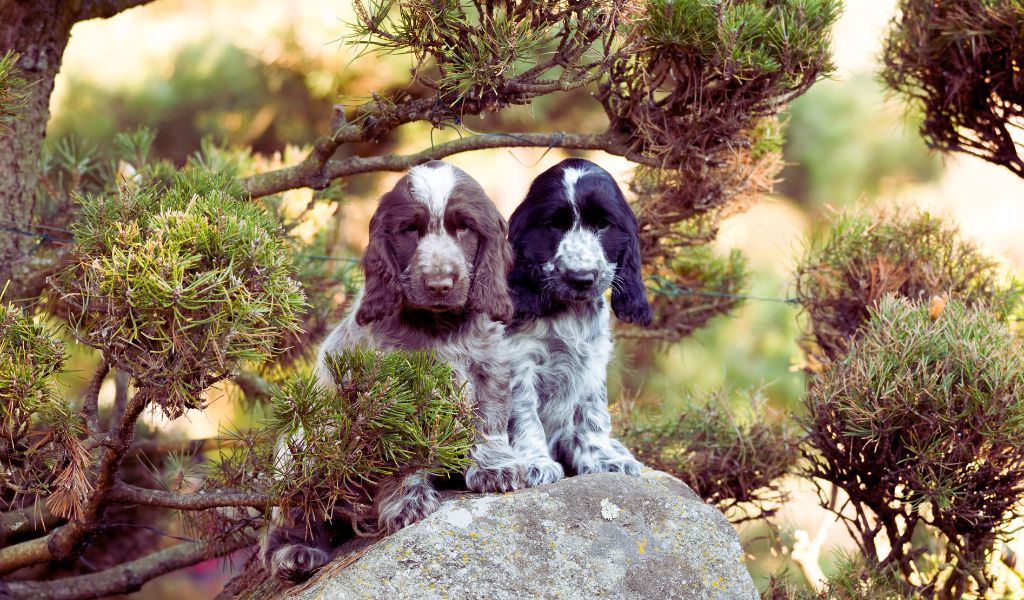
Breed-specific training considerations
When it comes to training Cocker spaniels, there are a few breed-specific considerations to keep in mind.
Cocker spaniels are known for their intelligence and willingness to please, which can make them relatively easy to train.
However, they can also be sensitive and have a propensity for anxiety, so it’s important to use positive reinforcement and gentle training methods.
Due to their hunting heritage, Cockers have a strong prey drive and may be easily distracted by small animals or birds, so it’s important to work on recall and focus in training sessions.
Additionally, Cocker spaniels can have a tendency to be nervous or aggressive if not properly socialized, so early and ongoing socialisation is essential.
Overall, training a Cocker spaniel requires patience, consistency, and understanding of their unique temperament and instincts.
With the right approach, they can become well-behaved and obedient companions.
Training basics
The importance of positive reinforcement training
Positive reinforcement training is extremely important when it comes to working with Cocker spaniels.
By using rewards such as treats, praise, and toys, owners and trainers can effectively communicate with their dogs and encourage desired behaviours.
This type of training not only helps in teaching obedience and basic commands but also strengthens the bond between the dog and its owner.
Additionally, positive reinforcement has been shown to reduce anxiety and fear in dogs, which is particularly important for Cocker spaniels who can be prone to separation anxiety.
Using punishment-based training methods can lead to increased fear and aggression in these sensitive dogs.
Therefore, it is essential to use positive reinforcement techniques to not only train Cocker spaniels effectively but also to ensure their emotional well-being and happiness.
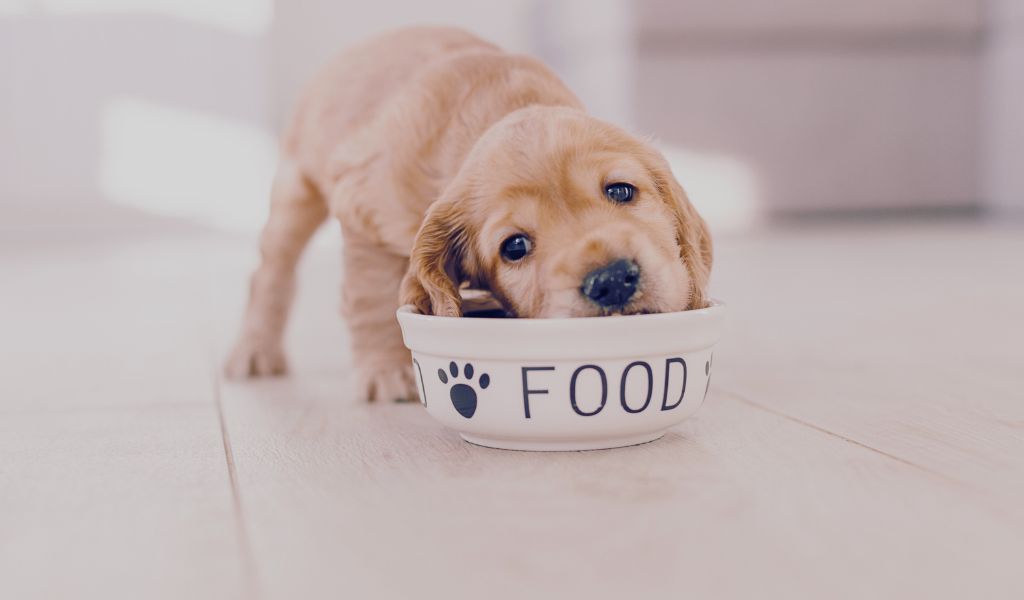
Use of treats, praise, and consistency in training
Treats can be a valuable tool for positive reinforcement, as Cockers are known for their food motivation.
By rewarding desired behaviours with treats, a Cocker spaniel is more likely to repeat those behaviours.
Additionally, praise is essential for building a strong bond with the dog and encouraging good behaviour.
Cockers are sensitive and responsive to their owners’ tone and body language, so praise in the form of verbal affirmations and physical affection can go a long way in their training.
Consistency is also key when training Cocker spaniels, as they thrive in a structured environment.
By being consistent with commands, rules, and routines, a Cocker spaniel will have a better understanding of what is expected of them, leading to more successful training outcomes.
Overall, a balanced approach of treats, praise, and consistency is effective in shaping a well-behaved and happy spaniel.
Provide tips for setting up a training schedule and routine
Setting up a training schedule and routine for your Cocker spaniel is essential for their development and wellbeing.
Start by establishing a consistent daily routine for feeding, exercise, and training sessions.
Plan short but frequent training sessions, as they can have a relatively short attention span.
Focus on socialisation, obedience, and basic commands such as sit, stay, and come.
Make sure to include regular exercise in the schedule to keep your Cocker spaniel physically and mentally stimulated.
As they are highly intelligent and energetic dogs, they require plenty of mental and physical activity.
Additionally, be patient and consistent with your training, as it takes time and dedication to see results.
With a well-structured training schedule and routine, your Cocker spaniel will thrive and become a well-behaved and happy companion.
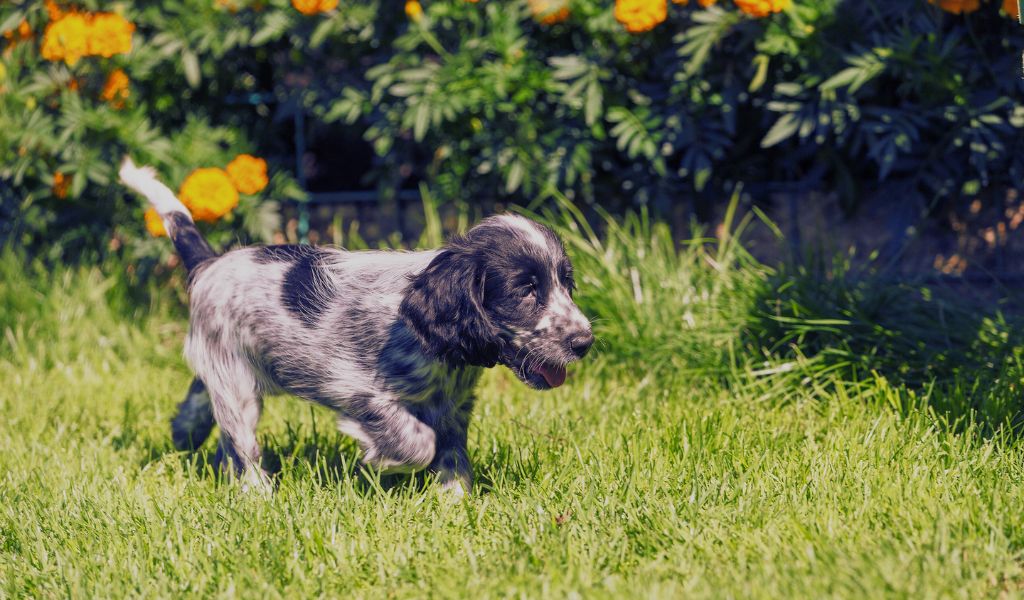
Socialisation
Importance of socialising a Cocker spaniel puppy
Socialising a Cocker spaniel puppy is crucial for their overall well-being and development.
Exposing them to different people, animals, and environments from a young age helps them become well-adjusted and confident adults.
Proper socialisation can prevent behavioural issues such as aggression, fearfulness, and anxiety, which can arise from a lack of exposure to new experiences.
It also helps the puppy to learn appropriate behaviour and manners, making them easier to handle in public places and around other animals.
Socialising a Cocker spaniel puppy can also reduce the likelihood of them developing separation anxiety and can make them more adaptable to new situations and changes in their environment.
It is essential for their mental and emotional health, as well as for their safety, as a well-socialised puppy is less likely to become stressed or fearful in unfamiliar situations.
The best ways to socialise a puppy, including exposure to new people, animals, and environments
Introducing your puppy to new people, animals, and environments from a young age is essential for building their confidence and teaching them how to interact with the world around them.
Take your puppy to different places such as parks, beaches, and busy streets to expose them to various sights, sounds, and smells.
Encourage positive interactions with other dogs and animals to help them learn appropriate social behaviour.
It’s also important to introduce your puppy to a variety of people, including different ages, genders, and ethnicities, to help them feel comfortable around a diverse range of individuals.
Additionally, enrolling your puppy in obedience classes or puppy socialisation groups can provide structured environments for them to interact with other dogs and people in a controlled setting.
By exposing your puppy to new experiences and social situations, you can help them grow into a well-adjusted and confident adult dog.
How to handle anxiety and fear during the socialisation process
It’s important to remember that puppies, like humans, can also feel overwhelmed in new social situations.
To handle anxiety and fear, it’s crucial to start the socialisation process slowly and gradually expose the puppy to new environments, people, and animals.
Positive reinforcement and rewards play a key role in building the puppy’s confidence and easing their fears.
Gentle, calm, and reassuring handling during social interactions can also help ease their anxiety.
It’s important to avoid forcing the puppy into uncomfortable situations and instead allow them to approach new experiences at their own pace.
Being patient, understanding, and supportive will go a long way in helping the cocker spaniel puppy overcome anxiety and fear during the socialisation process, and ultimately develop into a well-adjusted and confident adult dog.
Obedience Training
Basics of teaching commands such as sit, stay, and come
Teaching basic commands such as sit, stay, and come is essential for Cocker spaniels to ensure they are well-behaved and obedient.
Start with the sit command by holding a treat close to their nose and slowly moving it back over their head. As their head goes up and their bottom goes down, say “sit” and give them the treat.
Practice this several times until they can sit on command without the treat.
For stay, have them sit, then hold your hand up like a stop sign and say “stay” while taking a step back. If they stay, reward them with a treat.
For come, use a long leash and let them wander a few steps away, then call their name followed by the command and gently reel them in if necessary.
Repeat this process until they come consistently when called.
Consistency, patience, and positive reinforcement are key when teaching these commands.
Tips for lead training and walking
Lead training and walking with Cocker spaniels can be a challenging task, but with the right approach, it can be a rewarding experience for both you and your dog.
Start by using a well-fitting harness instead of a collar, as it will provide more control and reduce the risk of injury to your dog’s neck.
When walking, it’s important to set the pace and be the leader, as Cocker spaniels are known for their energetic nature which can result in them pulling to get ahead.
Use positive reinforcement techniques such as treats and praise to encourage your dog to walk calmly by your side.
Consistency is key, so be sure to practice lead training regularly and make it a part of your daily routine.
Additionally, it’s important to provide regular exercise for your Cocker to help release energy and prevent behavioral problems.
With patience, consistency, and the right tools, lead training and walking with your Cocker spaniel can become an enjoyable and fulfilling activity for both of you.
Advice on handling common behaviour issues such as chewing and jumping
Cocker spaniels can be prone to common behaviour issues such as chewing and jumping, but with the right training and guidance, these issues can be effectively managed.
When it comes to chewing, it’s important to provide plenty of appropriate chew toys and to consistently redirect your spaniel to these toys whenever they start to chew on something they shouldn’t.
Additionally, crate training can help limit their access to household items that they might want to chew on.
For jumping, it’s important to teach your Cocker spaniel the “off” command and to consistently reinforce this command whenever they try to jump on people.
It’s also crucial to provide plenty of exercise and mental stimulation to keep them occupied and prevent unwanted behaviours.
Positive reinforcement techniques, such as giving treats or praise when they exhibit desired behaviours, can also be highly effective.
Consistency and patience are key when addressing these behaviour issues, and seeking guidance from a professional trainer or behaviourist can also be incredibly helpful.
House training
The process of house training a Cocker spaniel puppy
House training a Cocker spaniel puppy can be a challenging but rewarding process.
The key is to establish a consistent routine and to be patient and persistent.
Start by designating a specific area outside and take your puppy to that spot after every meal, nap, and playtime.
Give plenty of praise and treats when he does his business in the right place to reinforce the good behaviour.
It’s important to keep a close eye on your puppy and learn to recognise his signs that he needs to go, such as pacing, sniffing around, or whining.
When accidents happen inside, it’s crucial to clean the area thoroughly to remove any scent, as lingering odours can encourage repeat accidents.
With consistency, positive reinforcement, and lots of patience, your Cocker spaniel puppy will eventually learn the proper bathroom manners.
Tips for establishing a bathroom routine
Establishing a bathroom routine for a Cocker spaniel is essential for keeping their toilet needs in check.
To start, take your dog out for bathroom breaks first thing in the morning, after meals, and before bedtime. Consistency is key, so try to stick to these times every day.
When your dog successfully goes to the bathroom outside, be sure to praise and reward them with treats.
If accidents happen inside, clean them up thoroughly and without scolding your dog.
It’s important to also pay attention to your dog’s behaviour and cues, such as sniffing or circling, which may indicate they need to go out.
Advanced training for Cocker spaniels
This type of training can include advanced obedience commands, agility exercises, and even scent detection work.
With their eager-to-please nature and love for learning, Cocker spaniels can thrive in advanced training programs.
Owners may choose to enroll their Cocker spaniels in specialised classes or work with a professional trainer who has experience working with this breed.
Training in advanced activities not only challenges the dog but also strengthens the bond between the dog and its owner.
It also provides an outlet for their high energy levels and keeps them emotionally and physically satisfied.
Furthermore, advanced training can help to channel their naturally curious and active nature into productive and enjoyable activities, making them both mentally and physically healthier dogs.
Advanced training such as agility and obedience competitions
Once a Cocker spaniel has mastered basic obedience training, owners may consider more advanced techniques such as agility and obedience competitions.
Agility training involves guiding the dog through an obstacle course, including jumps, tunnels, and weave poles, all while timed for speed and accuracy.
This not only provides physical exercise for the dog but also mental stimulation as they learn to navigate the course with their handler.
Obedience competitions focus on more complex commands and precision, testing the dog’s ability to follow commands in various environments and distractions.
Both of these training techniques require a strong bond between the dog and owner, as well as consistent practice and positive reinforcement.
Participating in these competitions can be a fun and rewarding way to continue training a Cocker spaniel, allowing them to showcase their skills and athleticism while also deepening the bond between the dog and their owner.
The benefits of continued training as a Cocker spaniel puppy grows
Continued training for a growing Cocker spaniel puppy offers numerous benefits for both the dog and its owner.
As the puppy grows, it will become stronger and more energetic, making it essential to reinforce good behaviour and teach commands to ensure the dog remains obedient and well-behaved.
Training also helps to strengthen the bond between the owner and the dog, as it creates a channel for clear communication and understanding.
Consistent training will also help the puppy to develop good manners and social skills, making it easier to introduce the dog to new people and other animals.
In addition, ongoing training can prevent behavioural problems from developing as the dog matures, such as excessive barking, aggression, or separation anxiety.
Ultimately, continued training will help a Cocker spaniel to become a well-rounded and well-adjusted adult dog, making for a more harmonious and enjoyable relationship with its owner.
Cocker spaniel puppy training FAQ
1. How to start training a Cocker spaniel puppy?
Cocker spaniel puppy training is essential for a well-behaved and happy dog. Start by establishing a routine that includes regular training sessions and positive reinforcement. Use treats and praise to teach your puppy basic commands such as sit, stay, and come. It’s important to begin training early to set the foundation for good behaviour.
2. What are some effective training techniques for Cocker spaniel puppies?
When training a Cocker spaniel puppy, it’s important to use positive reinforcement techniques. Reward good behaviour with treats, praise, and playtime. Incorporate crate training to provide structure and a safe space for the puppy. Consistency and patience are key to successful puppy training.
3. How to socialise a Cocker spaniel puppy?
Socialisation is crucial for a Cocker spaniel puppy. Expose the pup to various environments, people, and other dogs to help them develop into a well-adjusted adult dog. Enroll in puppy classes and organize training sessions with other puppy and dog owners to ensure they become comfortable around different people and animals.
4. What are some common challenges in training Cocker spaniel puppies?
Cocker spaniel puppies are known for their energy and intelligence, which can lead to stubbornness during training sessions. It’s important to maintain patience and use consistent training methods to overcome challenges. Additionally, working with a breeder who specialises in the breed can provide valuable insights and support if you are unsure.

